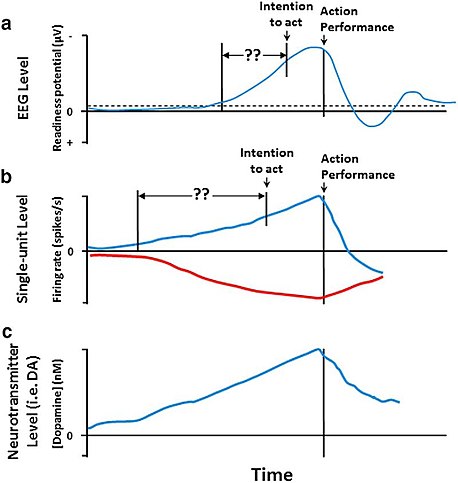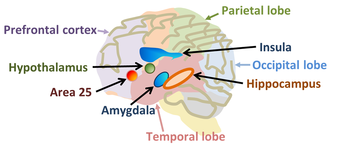
Back تجربة ليبيت Arabic Neurociencia del libre albedrío Spanish علوم اعصاب اختیار Persian 神經科學中的自由意志 Chinese
This article's tone or style may not reflect the encyclopedic tone used on Wikipedia. (January 2022) |

The neuroscience of free will, a part of neurophilosophy, is the study of topics related to free will (volition and sense of agency) using neuroscience and the analysis of how findings from such studies may impact the free will debate.
As medical and scientific technology has advanced, neuroscientists have become able to study the brains of living humans, allowing them to observe the brain's decision-making processes and revealing insights into human agency, moral responsibility, and consciousness.[2][3][4] One of the pioneering studies in this field was conducted by Benjamin Libet and colleagues in 1983[5] and has been the foundation of many studies in the years since.[citation needed] Other studies have attempted to predict the actions of participants before they happen,[6][7] explore how we know we are responsible for voluntary movements as opposed to being moved by an external force,[8] or how the role of consciousness in decision-making may differ depending on the type of decision being made.[9]

Philosophers like Daniel Dennett and Alfred Mele question the language used by researchers, suggesting that "free will" means different things to different people (e.g., some notions of free will posit that free will is compatible with determinism,[10] while others do not). Dennett insists that many important and common conceptions of "free will" are compatible with the emerging evidence from neuroscience.[11][12][13][14]
- ^ Schurger, Aaron; Sitt, Jacobo D.; Dehaene, Stanislas (2012-10-16). "An accumulator model for spontaneous neural activity prior to self-initiated movement". Proceedings of the National Academy of Sciences. 109 (42): E2904–E2913. Bibcode:2012PNAS..109E2904S. doi:10.1073/pnas.1210467109. ISSN 0027-8424. PMC 3479453. PMID 22869750.
- ^ The Institute of Art and Ideas. "Fate, Freedom and Neuroscience". IAI. Archived from the original on 2 June 2015. Retrieved 14 January 2014.
- ^ Cite error: The named reference
BACwas invoked but never defined (see the help page). - ^ Cite error: The named reference
Holtonwas invoked but never defined (see the help page). - ^ Libet, Benjamin (1985). "Unconscious cerebral initiative and the role of conscious will in voluntary action" (PDF). The Behavioral and Brain Sciences. 8 (4): 529–566. doi:10.1017/s0140525x00044903. S2CID 6965339. Archived from the original (PDF) on 19 December 2013. Retrieved 18 December 2013.
- ^ Cite error: The named reference
soonetalwas invoked but never defined (see the help page). - ^ Maoz, Uri; Mudrik, Liad; Rivlin, Ram; Ross, Ian; Mamelak, Adam; Yaffe, Gideon (2014-11-07), "On Reporting the Onset of the Intention to Move", Surrounding Free Will, Oxford University Press, pp. 184–202, doi:10.1093/acprof:oso/9780199333950.003.0010, ISBN 9780199333950
- ^ Cite error: The named reference
WegnerWheatley1999was invoked but never defined (see the help page). - ^ Mudrik, Liad; Koch, Christof; Yaffe, Gideon; Maoz, Uri (2018-07-02). "Neural precursors of decisions that matter—an ERP study of deliberate and arbitrary choice". bioRxiv: 097626. doi:10.1101/097626.
- ^ Smilansky, S. (2002). "Free will, fundamental dualism, and the centrality of illusion". The Oxford handbook of free will.
- ^ Cite error: The named reference
WalterHwas invoked but never defined (see the help page). - ^ Cite error: The named reference
Kanewas invoked but never defined (see the help page). - ^ Cite error: The named reference
NatureAimwas invoked but never defined (see the help page). - ^ Cite error: The named reference
Dennettwas invoked but never defined (see the help page).
© MMXXIII Rich X Search. We shall prevail. All rights reserved. Rich X Search